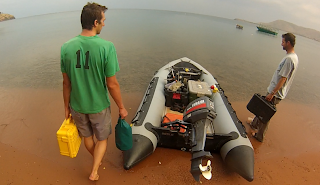For the past 48 hours, Benja and I have been finishing up the
ongoing fish excretion component to the project. It’s pretty similar to last
year’s endeavor except that it occurs primarily at NIGHT (in year 3, we
have to find creative ways to up the proverbial ante…). At this point we have a
pretty good handle on fish peeing rates during the day, but the suspicion is
that things probably tail off at night (which is personally true for me, so it
may hold true for the fishes as well.).
 |
| Two eretmodus, probably peeing... (photo by Benja) |
Just to be clear, we’re not interested in peeing for peeing’s
sake. As I’ve mentioned before, since Tanganyika is so lacking in nutrients, we
suspect the fish themselves facilitate nutrient cycling in the lake (Meaning: all
the attached algae probably take full advantage of the fact that hundreds of
fish pee on them constantly, providing them with nutrients to create biomass that,
in turn, feed the fish. I heart cycles.).
There’s a fair amount of prep work involved (like filtering
100 liters of water, labeling all the Ziplocs and vials, etc.…) and the field experience
is a bit nuts since a job that was formerly performed by 6 people is now done
by 3.
And, like I said, it’s all in the dark.
Once at site, we fill the bags with filtered water and our
old pal Georgie starts catching fish (I have No Idea how he holds the
flashlight AND manages to trap fish in the net at the same time, but he’s a
professional!).
 |
| Georgie is ready (as always) to catch some fish. |
Each fish gets dropped into his own bag, and after 30 minutes
of incubation time, we collect pee-water samples that will be analyzed for nitrate,
phosphate, and ammonium. We also get lengths and weights on each fish and hold
each bag until all the poop settles.
 |
| Ben sucks up poop. This was taken during a daylight endeavor, but you get the idea. |
 |
| Attack of the mayflies! They really liked the low beam on my headlamp. That, and the water I guess? |
Luckily our endeavor was cleverly (accidentally?) timed to coincide with the Perseid meteor shower, which made me feel marginally less sorry for myself for being awake at a time of night I reserve exclusively for sleeping. While it’s not super fun assembling the boat/motor/gear with the aid of a headlamp, it is SUPER AWESOME driving full-speed on a Zodiac in nearly-complete darkness to a random spot on shore 6km down the beach in the middle of the night (that’s not sarcasm).














